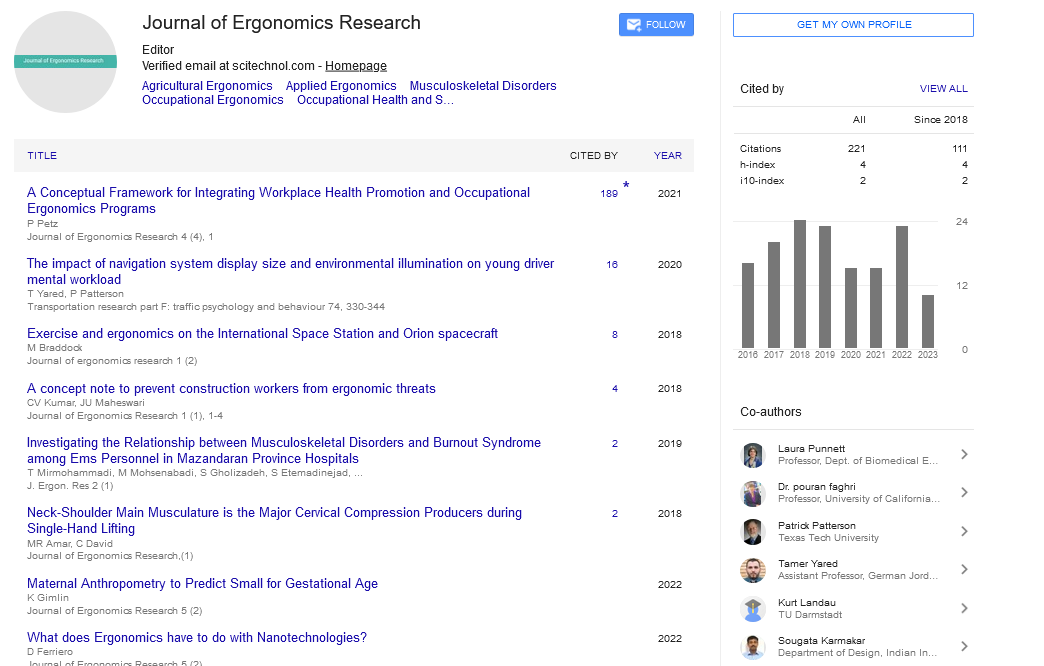Perspective, J Ergon Res Vol: 6 Issue: 2
An Overview on Work Physiology: Its Nutrition and Hydration
Ingrid Lauk*
1Department of Nutrition, University of Melbourne, Parkville, Australia
*Corresponding Author: Ingrid Lauk,
Department of Nutrition, University of
Melbourne, Parkville, Australia
E-mail: laukingrid@uit.ac.au
Received date: 30 May, 2023, Manuscript No. JEOR-23-107522;
Editor assigned date: 02 June, 2023, PreQC No. JEOR-23-107522 (PQ);
Reviewed date: 16 June, 2023, QC No. JEOR-23-107522;
Revised date: 23 June, 2023, Manuscript No. JEOR-23-107522 (R);
Published date: 30 June, 2023 DOI: 10.4172/JEOR.1000132
Citation: Lauk I (2023) An Overview on Work Physiology: Its Nutrition and Hydration. J Ergon Res 6:2.
Description
Work physiology is a multidisciplinary scientific field that focuses on understanding the physiological responses and adaptations of the human body during various forms of work, exercise, and physical activity. It combines knowledge from physiology, biomechanics, nutrition, and psychology to shed light on how the body functions, endures, and responds to different work demands.
Cardiorespiratory responses to work
The cardiovascular and respiratory systems play an important role in meeting the increased oxygen and nutrient demands of working muscles. During exercise, heart rate, stroke volume, and cardiac output increase to pump more oxygenated blood to the muscles. Simultaneously, respiratory rate and tidal volume rise to facilitate oxygen uptake and carbon dioxide removal.
Regular physical activity enhances the efficiency of the cardiovascular system, leading to a lower resting heart rate, increased stroke volume, and improved oxygen delivery to the tissues. These adaptations contribute to improved endurance and work capacity.
Thermoregulation and heat stress
Thermoregulation is the body's ability to maintain a stable core temperature during work, even when external conditions change. Heat stress can be a significant concern in physically demanding occupations or hot environments. The body uses various mechanisms to dissipate heat, including sweating, vasodilation, and increased blood flow to the skin.
Prolonged exposure to high temperatures and inadequate hydration can lead to heat-related illnesses such as heat cramps, heat exhaustion, or even life-threatening heatstroke. Proper hydration and acclimatization to the environment are essential for preventing heat-related issues in the workplace.
Musculoskeletal function
The musculoskeletal system supports and enables physical work. Understanding its biomechanics helps identify potential injury risks and optimize work processes. Repetitive and strenuous tasks can lead to Musculoskeletal Disorders (MSDs) if not managed correctly.
Ergonomics, a subfield of work physiology, focuses on designing work environments and tasks to minimize physical strain and reduce the risk of MSDs. By considering factors such as posture, force exertion, and equipment design, ergonomics seeks to create safer and more efficient work conditions.
Nutrition and hydration
Proper nutrition and hydration are essential for optimal work performance and recovery. Nutrition provides the necessary macronutrients (carbohydrates, proteins, and fats) and micronutrients (vitamins and minerals) to fuel physical activity and support cellular function.
Carbohydrates are particularly crucial for providing energy during intense work, while proteins aid in muscle repair and recovery. Fats serve as an energy source during prolonged, lower-intensity activities. Adequate hydration is essential for maintaining blood volume, thermoregulation, and nutrient transport.
Psychological factors
The psychological aspect of work physiology is crucial, as mental factors can significantly impact work performance and overall wellbeing. Motivation, focus, and mental endurance are critical components in achieving work-related goals.
Stress and anxiety can hinder performance and lead to burnout. Implementing strategies such as goal-setting, mindfulness, and relaxation techniques can help individuals cope with work-related stress and enhance performance.
Work physiology provides valuable insights into how the human body responds to physical activity, making it a fundamental aspect of occupational health and performance improvement. By understanding energy systems, cardiovascular responses, thermoregulation, and other physiological mechanisms, we can enhance work performance, reduce the risk of injuries, and promote overall well-being in the workplace. Applying the principles of work physiology can lead to safer, more efficient work environments and ultimately improve the quality of life for workers across various industries.
 Spanish
Spanish  Chinese
Chinese  Russian
Russian  German
German  French
French  Japanese
Japanese  Portuguese
Portuguese  Hindi
Hindi 